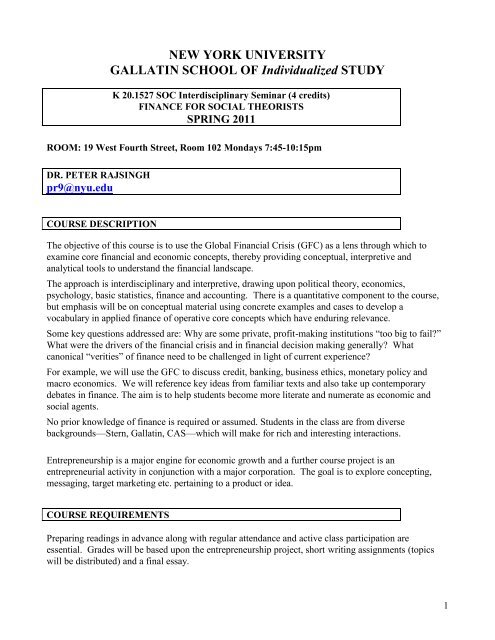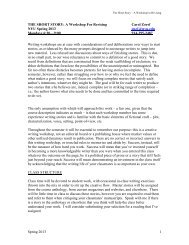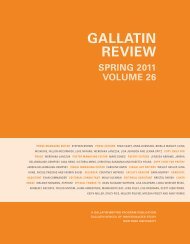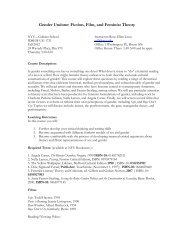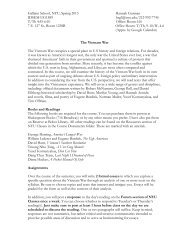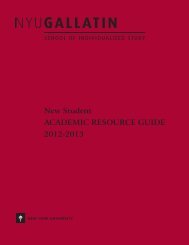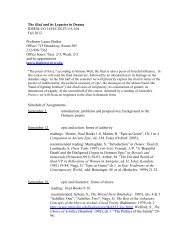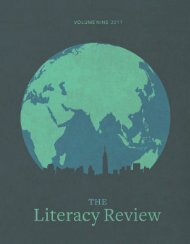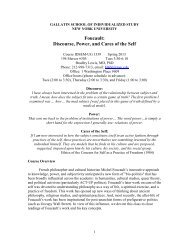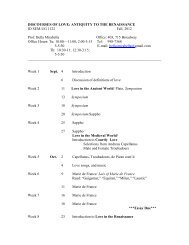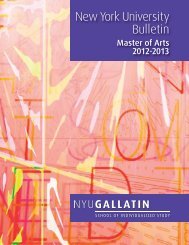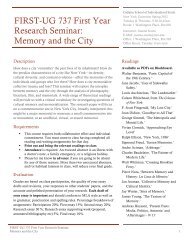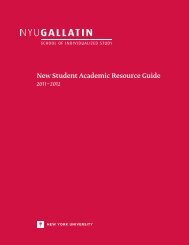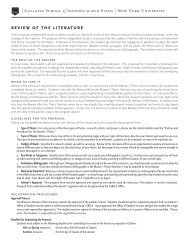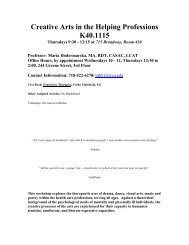New York University - Gallatin School of Individualized Study - New ...
New York University - Gallatin School of Individualized Study - New ...
New York University - Gallatin School of Individualized Study - New ...
You also want an ePaper? Increase the reach of your titles
YUMPU automatically turns print PDFs into web optimized ePapers that Google loves.
NEW YORK UNIVERSITY<br />
GALLATIN SCHOOL OF <strong>Individualized</strong> STUDY<br />
K 20.1527 SOC Interdisciplinary Seminar (4 credits)<br />
FINANCE FOR SOCIAL THEORISTS<br />
SPRING 2011<br />
ROOM: 19 West Fourth Street, Room 102 Mondays 7:45-10:15pm<br />
DR. PETER RAJSINGH<br />
pr9@nyu.edu<br />
COURSE DESCRIPTION<br />
The objective <strong>of</strong> this course is to use the Global Financial Crisis (GFC) as a lens through which to<br />
examine core financial and economic concepts, thereby providing conceptual, interpretive and<br />
analytical tools to understand the financial landscape.<br />
The approach is interdisciplinary and interpretive, drawing upon political theory, economics,<br />
psychology, basic statistics, finance and accounting. There is a quantitative component to the course,<br />
but emphasis will be on conceptual material using concrete examples and cases to develop a<br />
vocabulary in applied finance <strong>of</strong> operative core concepts which have enduring relevance.<br />
Some key questions addressed are: Why are some private, pr<strong>of</strong>it-making institutions “too big to fail?”<br />
What were the drivers <strong>of</strong> the financial crisis and in financial decision making generally? What<br />
canonical “verities” <strong>of</strong> finance need to be challenged in light <strong>of</strong> current experience?<br />
For example, we will use the GFC to discuss credit, banking, business ethics, monetary policy and<br />
macro economics. We will reference key ideas from familiar texts and also take up contemporary<br />
debates in finance. The aim is to help students become more literate and numerate as economic and<br />
social agents.<br />
No prior knowledge <strong>of</strong> finance is required or assumed. Students in the class are from diverse<br />
backgrounds—Stern, <strong>Gallatin</strong>, CAS—which will make for rich and interesting interactions.<br />
Entrepreneurship is a major engine for economic growth and a further course project is an<br />
entrepreneurial activity in conjunction with a major corporation. The goal is to explore concepting,<br />
messaging, target marketing etc. pertaining to a product or idea.<br />
COURSE REQUIREMENTS<br />
Preparing readings in advance along with regular attendance and active class participation are<br />
essential. Grades will be based upon the entrepreneurship project, short writing assignments (topics<br />
will be distributed) and a final essay.<br />
1
1. ATTENDANCE<br />
There are 14 sessions for this course. Attendance will be taken and unexcused absences noted.<br />
2. GRADING<br />
Your brief writing assignments, and project will be evaluated by how well you integrate the course<br />
concepts into your analysis.<br />
3. HOMEWORK: Written <strong>Study</strong> Question Analyses (2 to 4 pages typed)<br />
Each student is responsible for handing written homework assignments.<br />
4. FINAL ESSAY (8 – 10 pages typed & double-spaced)<br />
5. GRADE WEIGHTS<br />
1. Class Participation 30%<br />
2. Homework & Quizes 30%<br />
3. Term Paper & Entrepreneurship Project 40%<br />
6. HONOR CODE<br />
Students are reminded that they must adhere to the MBA Honor Code and report any suspected<br />
violation <strong>of</strong> the code that he or she has observed.<br />
7. LAPTOP POLICY<br />
Students are permitted to use laptops to take notes and for other relevant class activities. However,<br />
persistent surfing the web or checking email during class resulting in students not being engaged during<br />
class discussions will be noted and may penalize grades.<br />
READING LIST:<br />
Please note readings will mostly be announced and sent to students via Blackboard rather than being<br />
apportioned in the syllabus for specific class dates. Some readings will be distributed and students will<br />
be required to source others from websites. Many <strong>of</strong> the readings will be drawn from real time<br />
materials ranging from newspaper articles and financial analytical pieces to reports from asset<br />
managers.<br />
Please also join www.rgemonitor.com using your NYU net ID.<br />
Further supplementary readings may be added to this list.<br />
Core Texts:<br />
Adam Smith, Wealth <strong>of</strong> Nations (excerpts)<br />
John Stuart Mill, Principles <strong>of</strong> Political Economy (excerpts)<br />
2
Peter Bernstein, Against the Gods: The Remarkable Story <strong>of</strong> Risk<br />
Nassim Taleb, Fooled by Randomness: The Hidden Role <strong>of</strong> Chance in the Markets and in Life<br />
George Soros, The Crash <strong>of</strong> 2008<br />
Benoit Mandelbrot, The (Mis)Behavior <strong>of</strong> Markets<br />
Mohammed El-Erian, When Markets Collide<br />
Richard C. Koo, Balance Sheet Recession<br />
Seth A. Klarman, Margin <strong>of</strong> Safety: Risk-Averse Value Investing Strategies for the Thoughtful Investor<br />
David Einhorn, Fooling Some <strong>of</strong> the People All <strong>of</strong> the Time<br />
LIST OF SESSIONS<br />
SESSION ONE: Monday January 24<br />
SESSION TWO: Monday January 31<br />
SESSION THREE: Monday February 7<br />
SESSION FOUR: Monday February 14<br />
Monday February 21 (Presidents Day)<br />
SESSION FIVE: Monday February 28<br />
SESSION SIX: Monday March 7<br />
Monday March 14 (Spring Break)<br />
SESSION SEVEN: Monday March 21<br />
SESSION EIGHT: Monday March 28<br />
SESSION NINE: Monday April 4<br />
SESSION TEN: Monday April 11<br />
SESSION ELEVEN: Monday April 18<br />
SESSION TWELVE: Monday April 25<br />
SESSION THIRTEEN: Monday May 2<br />
SESSION FOURTEEN:<br />
Monday May 9 (Last Class)<br />
FINAL EXAM:<br />
3
USEFUL WEBSITES:<br />
http://www.wolframalpha.com/examples/MoneyAndFinance.html<br />
http://www.duke.edu/~charvey/Classes/wpg/glossary.htm<br />
http://www.investopedia.com/<br />
http://www.stockmapper.com/NYXtrac.html<br />
http://www.roubini.com/index.php<br />
http://noir.bloomberg.com/<br />
http://www.ft.com/home/us<br />
http://ftalphaville.ft.com/<br />
http://online.wsj.com/home-page<br />
http://online.barrons.com/home-page<br />
http://www.businessweek.com/<br />
http://www.khanacademy.org/ (finance material on the site)<br />
http://www.pimco.com/Pages/EducationOverview.aspx<br />
http://www.sifma.org/research/research.aspx?ID=10256<br />
http://www.edgar-online.com/DataDocuments.aspx<br />
http://www.absolutereturn-alpha.com/<br />
http://www.straightstocks.com/<br />
http://paul.kedrosky.com/<br />
http://www.calculatedriskblog.com/<br />
http://allaboutalpha.com/blog/<br />
http://www.gurufocus.com/<br />
http://www.pionline.com/section/blogbank<br />
http://seekingalpha.com/<br />
http://www.financialsense.com/<br />
4


